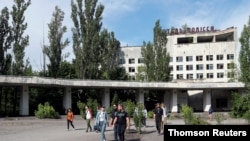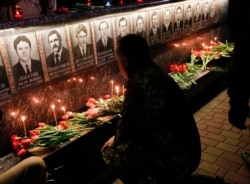A pro-Kremlin Russian TV network is planning to air a mini-series about Chernobyl, one suggesting a CIA saboteur was behind the 1986 Soviet-era nuclear disaster in Ukraine, which left up to a million people exposed to radiation.
The Kremlin was angered by the recent, highly acclaimed HBO five-part mini-series on Chernobyl, which lauded the self-sacrificing bravery of those who battled to contain the fire and mitigate the effects of a reactor meltdown, but also detailed Soviet-era mismanagement, the delayed response and the denial for years by Soviet officials of a design fault.
The officials at the time tried to place the blame for the deadly explosion solely on the mishandling of a test by a handful of incompetent plant managers.
Critics and audiences have placed the show at the top of IMDb’s list of highest-rated television series, ahead even of Game of Thrones, and the mini-series has been praised by historians for its authenticity. But Kremlin partisans, pro-government commentators and newspapers have torn into the HBO mini-series, claiming it tarnishes the image of Russia as a great nuclear power.
The Moscow weekly Argumenty i Fakty dismissed the show as “a caricature and not the truth.” Stanislav Natanzon, an anchor at Russia-24, one of the country’s main news channels, joked, “The only things missing are the bears and accordions!”
Writing in the Moscow Times, Ilya Shepelin, a broadcaster with Dozhd, an independent media outlet, says the slurs are partly rooted in “jealous resentment” and “says more about the critics than it does about the series.” He added: “The fact that an American, not a Russian, TV channel tells us about our own heroes is a source of shame that the pro-Kremlin media apparently cannot live down.”
But other independent observers argue the major offense of the HBO mini-series from the Kremlin’s perspective was its lack of Russian patriotism. NTV, which is owned by the Kremlin-controlled energy giant Gazprom, intends to provide patriotism with its own series. It is being produced in Belarus and raises the idea that foreign-inspired conspiracy may have had a hand in the explosion of reactor No. 4 of the V. I. Lenin Nuclear Power Plant, near Pripyat.
According to media reports, Russia’s culture ministry is helping to fund the NTV show with a $460,000 grant.
Marketing literature for the NTV series details a plot revolving around a CIA agent infiltrated into Pripyat and tasked with gathering intelligence on the Chernobyl nuclear power plant.
The hero of the drama is a Russian counterintelligence agent dispatched to track him down.
Reality vs fiction
There is no evidence that a CIA agent was ever present, but the show’s director Alexei Muradov says his drama “will tell viewers about what really happened back then.”
It will do so apparently without re-telling the stories of the firefighters and first-responders who battled the fire or the harrowing tales of the hundreds of soldiers and civilians drafted in to clear deadly radioactive debris, contain the fallout and cap the reactor.
Alexei Muradov has said: “One theory holds that Americans had infiltrated the Chernobyl nuclear power plant and many historians do not deny that, on the day of the explosion, an agent of the enemy’s intelligence services was present at the station.”
NTV has in recent years produced controversial documentaries that reflect the views of the Kremlin.
In August 2014, it broadcast a documentary describing critics of Russia's policies in Ukraine as “traitors” and “fascists” and skewed footage of a concert. Another program “Anatomy of a Protest” portrayed anti-government agitators in former Soviet states as “Western puppets” and CIA agents and used edited wiretaps apparently leaked to the producers by the Russian FSB intelligence service.
Estimates of deaths as a result of radiation released by the explosion of Reactor 4 vary from 4,000 in an initial United Nations study to up to 200,000 reported by Greenpeace. Radioactive plumes drifted over large parts of the western Soviet Union and Europe. According to official post-Soviet data about 60 percent of the fallout landed in Belarus.
The Kremlin did not acknowledge the nuclear accident until two days after the explosion when scientists in Sweden raised the alarm about a sharp spike in radiation levels apparently coming from the Soviet Union.
Then Soviet leader Mikhail Gorbachev did not comment publicly for three weeks, and has consistently denied there was any cover-up, insisting authorities in Moscow did not know what was happening. “We spent the first days trying to get the picture,” Gorbachev told the Associated Press in 2006. “I can’t agree that we were trying to conduct a sly policy and hide something. We realized the entire drama only later,” he said.
Historians later came to credit the Chernobyl disaster as a catalyst in forcing the decaying Soviet government to be more transparent — an openness called glasnost, which paved the way to reform and the subsequent Soviet collapse.
Russian leader Vladimir Putin seldom acknowledges Chernobyl or the disaster’s survivors, and then only on major anniversaries - the last time in 2016, on the 30th anniversary. Shepelin argues that is because Putin cannot turn the event into one of national pride.
Independent observers say that especially since 2012, the start of Putin’s third presidential term – the Kremlin has sought increasingly to keep the media in check with greater influence exerted over broadcasting content. Kremlin-friendly media owners are encouraged to portray Russia patriotically and “as a last bastion of traditional values” which is under attack by “a decadent, decaying West,” according to Russian journalist Daria Litvinova.
In a paper for the Reuters Institute published last year, she argued the government has been promoting a conservatism that rests on three pillars: the importance of the Orthodox Church, “family values,” and “the glorious Russian past.”
The HBO Chernobyl mini-series was not broadcast by any of Russia’s television outlets but was available online to paying viewers. Whether Russians in years to come will be able to watch a future mini-series like the HBO drama is in doubt, according to some Kremlin critics. Last month, the Duma preliminarily approved a law on “digital sovereignty” aimed at separating Russia’s Internet from the global one.







